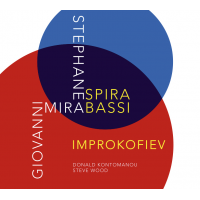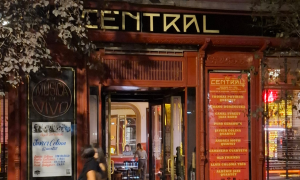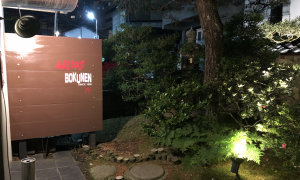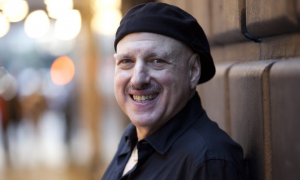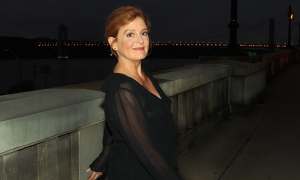Home » Jazz Articles » The Jazz Life » My Early Years With Bill Evans, Part 1
My Early Years With Bill Evans, Part 1

Bill’s playing was extraordinarily rhythmic—forceful and precise—swinging like crazy and, at the same time, colored with dynamic gradations and nuances of touch, tone and articulation. It spoke to me in more ways than any other jazz pianist.
—Chuck Israels
Chuck is currently writing a memoir of his life in jazz, and this is the first of three excerpts from it.
—Peter Rubie
Part 1 | Part 2 | Part 3
I was finished with school, never having really studied anything and not yet knowing how. I had $1,000, a small fortune in 1959, and bought a ticket to Europe on the Holland America Line. Most of my contemporaries did things like that. We went to Europe to find ourselves—as if we hadn't been living with ourselves for the better part of a quarter century but had somehow been hiding out in the old countries of our ancestors. Actually, trips like that do help you know yourself. They quickly reveal which parts of your personality are related to your immediate circumstances and which are part of your character, following wherever you go. But most of us didn't know that. We were genuinely curious about the romance of Europe and eager to get away from family influences.Though an ocean voyage may sound attractive, the North Atlantic on a relatively small ship, proved cold and rough even in the summer. But the send-off had been exciting. And the seven days from New York harbor to landfall in Cork, Ireland passed quickly enough. A day later, we docked in Le Havre, in France, where my old college roommate, Paolo Lionni, picked me up and drove me and my bass to Paris. I'd become close to Paulo and his sophisticated, artistic, European-American family. His father, Leo was a famous artist, illustrator, writer of children's books, and art director of Fortune Magazine. I'd been welcomed on vacations in their Greenwich, Connecticut home and enjoyed Nora Lionni's generous hospitality. They had a villa in Italy, and Paulo was a cosmopolitan, multi-lingual guy who was eager to introduce me to the pleasures of Europe.
On the drive to Paris, I could hardly contain my excitement. A stop at the Rouen Cathedral, where an organ concert was in progress, was overwhelming. The sight of this building in the midst of the old French town was more powerful than I could have imagined, but it was the music that brought me to tears. The organ was so loud, and the improvisatory quality of the music so spontaneous, that I couldn't help crying.
Paolo wanted to make sure my first sight of Paris was sufficiently spectacular, so we drove up Avenue de la Grande Armée, L'Arc de Triomphe looming in front of us, around L'Etoile and down Champs-Elysées. I don't think I've seen a more beautiful city before or since. I found a room in the Hotel de Londres on Rue Bonaparte, a couple of blocks toward the Seine from Boulevard Saint-Germain. Cheap hotel rooms in Paris were cramped, minimal and depressing, but everything else was enchanting, so I spent as little time as possible in the hotel. Paolo and I sat at Les Deux Magots watching the world pass by, and occasionally meeting other Americans.
My second night in Paris, Paolo invited me to a soirée at film director Roger Vadim's apartment on Rue Vielle du Temple, near Les Halles. The invitation was directed to me as a jazz musician, and so my bass and I arrived to movie cameras and lights, and the stunning Annette Stroyberg, then Mrs. Vadim. I was invited to play with Kenny Clarke and Bud Powell.
Bud's music had been the prototype for so much of what we played that I was awe struck at the idea. I'd only heard Charlie Parker on records. (I'd planned to hear him in 1955 at Storyville in Boston, but he died that week and I missed the chance.) Now I was playing with a legendary living fountainhead of our music. However, it was Kenny Clarke who was the most inspiring. His playing had the musical equivalent of what the dancers at Performing Arts called elevation: the illusion that laws of gravity were temporarily suspended. Kenny's beat made playing with him feel weightless. Of course, bass notes have to be played with solidity, and that requires effort, but when Kenny played with you he shared that effort in a way that lifted you. You could play chorus after chorus and not feel tired.
Bud, on the other hand, was so strange that I didn't know what to make of him. His playing meandered, without the strength I'd heard on his records, and he had a distracted grin that either stared past you or looked at you with only partial recognition. But he was the great Bud Powell, and the people respected his history.
Years earlier, Bud had been beaten in a fight and had several stays in mental hospitals where he'd been treated, probably badly. Now in Paris, Bud's wife Buttercup Edwards dosed him with antipsychotics, making him groggy and overweight. She kept him away from the one glass of cognac that would turn him even more morose. The man I met that night was a shell of the man I had heard on record. Those films from July 1959 probably exist in some archive and I'd be curious to see if watching them now would recall the off-centeredness I felt in Bud's playing and the joy I experienced with Kenny Clarke.
Buttercup went everywhere with Bud. She was his manager and caretaker, and after she heard me hired me a couple days later to play with Bud at his regular Le Chat Qui Pêche gig; it was a cave on Rue de la Huchette, off Boulevard Saint-Michel in the Latin Quarter. Both more than I'd dared to expect and a profound disappointment, the gig paid 500 old francs a night (the equivalent of $10)— enough for the hotel room and meals. The drummer was Granville "G.T." Hogan, a very good player in the Philly Joe Jones style. G.T., was a Texan whose expansive, friendly personality made it easier to deal with Bud's inability to make real social or musical contact. Our family friend, composer Marc Blitzstein, came through Paris and stopped by to hear me play with Bud, sending back a message to my folks about this skinny white kid playing in a dive with a fat black guy. The picture must have been amusing. (There is a picture of me from this period on the cover of a Bud Powell CD, although I don't play on that recording and never did record with Bud.)
I spent several months living and playing in Paris, but by 1960 I was back in New York. I had gotten to know Don Friedman, a good pianist who'd recently moved to New York from Los Angeles. He had a recording contract with Riverside Records and asked Joe Hunt and me to record with him. Don was friendly with Scott LaFaro, the brilliant bassist from Geneva, New York. Scotty had spent time in LA where he and Don met. I'd heard Scotty some time before in Boston and tried to engage him in conversation, only to be brushed off with disinterest. More recently, I'd heard him in a trio with Bill Evans and Paul Motian at an upstairs club in the Village across from where the Blue Note now stands. It was simply the best music I'd heard.
Bill's playing was extraordinarily rhythmic— forceful and precise—swinging like crazy and, at the same time, colored with dynamic gradations and nuances of touch, tone and articulation. It spoke to me in more ways than any other jazz pianist. Art Tatum was superhuman and full of variety, but Bill's playing was more developmental, less decorative. Erroll Garner was joyful and endlessly inventive, but as fulfilling as his music was, it was all about the piano part. Bass and drums were only accompaniment —the music would be the same with or without them.
There were other bebop pianists whose music I loved—Horace Silver, who made bold, percussive music with clear development and charming directness, though to my ears it lacked pianistic nuance and was always loud. Monk's unique approach to the piano, even more percussive than Horace's, seemed so excessive the monumental genius of his music eluded me at the time. I'd have been proud to have played with Red Garland, Hank Jones, Barry Harris, or Tommy Flanagan. Their music had countless qualities I valued but none of them had the breadth of Bill's to my ears.
Bill had absorbed more classical piano literature. Elements of Chopin, Scriabin and who knows what else were integrated into his music, flowing through it, fully part of it without self-conscious pastiche. And his style in trio playing omitted bass notes in the piano, leaving space for the bass to be heard and help shape the music. How could I not think this was where I wanted to be?
Hearing Bill's trio expanded my conception of what a jazz piano trio could do. His playing was developing—showing romantic elements of impressionistic harmony while retaining the clarity, beauty of sound, nuance of touch, and extraordinary rhythmic variety I already knew to expect. And Scotty was playing an integrated, even competitive role, abandoning conventional bass parts for several choruses at a time—exploring what the role of the bassist in a small group could really be, engaging in melodic counterpoint with Bill and doing it with blazing speed and pinpoint accuracy. The idea of a piano trio was being reinvented before me with the role for the bassist not just an accompanist but as a true musical partner.
Ahmad Jamal had featured bassist Israel Crosby's virtuosity and melodic invention in his influential trio recordings from Chicago a couple of years earlier. There were well developed roles for the bass and drums in that music too. But it was carefully controlled, and its arranged quality was part of its attraction. What Bill and Scotty were doing (with Paul Motian's helpful participation) was more improvisational and designed to accept and take advantage of spontaneous details. There was organization there, but it was hidden under a veneer of considerable improvisatory freedom. What Bill's music may have lacked in obvious structure, it gained in exciting, even dangerous spontaneity.
I admired Scotty greatly and envied his job with Bill. He was a virtuoso bassist and an extraordinary musician. I wanted to know him. At the record date with Don, Scotty showed up to visit and heard me play a couple of tunes. The old cool-to-nonexistent reception I'd gotten when first meeting him some time before turned instantly warm, and we were quick friends in a way that people who share similar musical sensibilities can be.
In July 1961 I was back in Europe, on tour with Jerome Robbins' Ballet U.S.A. I remember a sublime moment at an outdoor trattoria in Spoleto, Italy— glorious in the dazzlingly bright afternoon sun. I was grinning to myself and couldn't think why I was so cheerful. I had a letter from my friend Paula Robison in my jacket pocket that I'd received that morning, and was savoring the pleasure I'd have reading it when I had the time to concentrate and enjoy it. That moment had arrived.
Dear Chuck, Terrible news. Scotty was killed on July 6th in an automobile crash on the New York State Thruway...
A twenty-five-year-old and his high school buddy had slammed into a tree at 10 A.M. To most people it was barely newsworthy. To me, it was a defining moment.
Turning points burn in memory. I remember the street, the restaurant, the food, and the jacket I was wearing, but most of all I remember the unacceptability of my thoughts. I didn't want to admit to opportunism, but the feeling and preoccupation of it was persistent. I hadn't been responsible for Scotty's death. I hadn't imagined him gone, God knows I had never wished for it, even secretly, but I longed to be where he'd been.
Scotty had been a towering presence—a handsome, confident, gifted, and disciplined musician—and he'd established himself in a powerful alliance with Bill Evans, the musician whose work represented my highest aspirations. I'd known Bill's music for five or six years, heard him in person and on recordings, and grown to love his playing beyond all other music.
I was hit at the same time by two intense, conflicting emotions: nagging guilt about thinking more about myself than the friend I'd suddenly lost, and a happy anticipation of the musical adventure I was sure was just about to land on my doorstep. A good friend, one of the great virtuoso bass players of his generation, had died violently. And God forgive me, one of my first thoughts as I got over the shock of the news was selfish. I realized the position that Scotty had created and occupied commandingly—might well become mine.
Photo credit: Judy Kirtley
Tags
The Jazz Life
Chuck Israels
Peter Rubie
Kenny Clarke
Bud Powell
Charlie Parker
Granville "G.T." Hogan
Philly Joe Jones
Don Friedman
JOE HUNT
Scotty LaFaro
Bill Evans
Errol Garner
Horace Silver
Monk
Red Garland
Hank Jones
Barry Harris
Tommy Flanagan
Ahmad Jamal
Israel Crosby
PREVIOUS / NEXT
Support All About Jazz
 All About Jazz has been a pillar of jazz since 1995, championing it as an art form and, more importantly, supporting the musicians who make it. Our enduring commitment has made "AAJ" one of the most culturally important websites of its kind, read by hundreds of thousands of fans, musicians and industry figures every month.
All About Jazz has been a pillar of jazz since 1995, championing it as an art form and, more importantly, supporting the musicians who make it. Our enduring commitment has made "AAJ" one of the most culturally important websites of its kind, read by hundreds of thousands of fans, musicians and industry figures every month.



